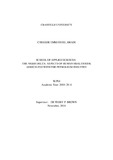JavaScript is disabled for your browser. Some features of this site may not work without it.
| dc.contributor.advisor | Brown, Terry P. | |
| dc.contributor.author | Amadi, Chigozie Emmanuel | |
| dc.date.accessioned | 2015-12-21T11:44:42Z | |
| dc.date.available | 2015-12-21T11:44:42Z | |
| dc.date.issued | 2014-11 | |
| dc.identifier.uri | http://dspace.lib.cranfield.ac.uk/handle/1826/9611 | |
| dc.description.abstract | The Niger Delta has been described as one of the most petroleum-polluted places in the world. The oil and gas industry located in this region is the economic mainstay of Nigeria and has contributed to key aspects of life in our modern society. However, the indigenous nationalities and residents of the Niger Delta have been exposed to appalling environmental conditions due to the operations of the upstream petroleum industry within their communities. Whereas much is known about the environmental consequences of the operations of the oil and gas industries, including the fallout of crude oil spillage incidences, comparatively, very little is known about the risks to human health due to exposures to these environmental conditions. This could be a source of fear and frustration. The knowledge about the human health repercussions of the upstream petroleum industry operations in the Niger Delta is nonexistent. This study investigated some aspects of risk to human health in the Niger Delta due to the operations of the petroleum industry, especially carcinogenic risk. The major risk drivers were identified as benzene and the other BTEX compounds, PAHs, heavy metals, and particulates. A combination of observational studies, focus group meetings, structured self-report questionnaire administration, and cross-sectional biomonitoring assays were used as methods in the study which was carried out in Bayelsa and Rivers State. Ethnographic inquisitions were undertaken to understand peculiarities and lifestyles that may underpin exposure characterisation. In the cross-sectional studies, Ogale-Eleme, which has been described as the poster child of the crude oil pollution in Niger Delta was sampled. The demographics, biometrics, self-reported health effects, full blood count parameters and micronucleus count in peripheral blood lymphocytes in 258 volunteers from the community were compared with the results obtained from 111 volunteers from Rumuche, Emohua, which was analysed as the reference community. ...[cont.] | en_UK |
| dc.language.iso | en | en_UK |
| dc.publisher | Cranfield University | en_UK |
| dc.rights | © Cranfield University, 2015. All rights reserved. No part of this publication may be reproduced without the written permission of the copyright holder. | en_UK |
| dc.title | The Niger delta: aspects of human health risk associated with the petroleum industry | en_UK |
| dc.type | Thesis or dissertation | en_UK |
| dc.type.qualificationlevel | Masters | en_UK |
| dc.type.qualificationname | MPhil | en_UK |
